| Srl | Item |
| 1 |
ID:
140140


|
|
|
|
|
| Summary/Abstract |
The root causes of the current severe standoff between Russia and the West over Ukraine, at times reminiscent of the worst years of the Cold War, have puzzled both pundits and politicians alike. Some of the reasons are on the surface, while others may take a while to unearth. In any case the conflict is not just a routine clash of geopolitical interests. In fact, Russia and the West are experiencing another moment of truth. Both sides will analyze this period and the conclusions will shape the future.
|
|
|
|
|
|
|
|
|
|
|
|
|
|
|
|
| 2 |
ID:
140138
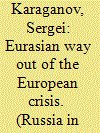

|
|
|
| 3 |
ID:
140154


|
|
|
|
|
| Summary/Abstract |
The Russian media have lately been replete with articles about the future of Ukraine. They can be divided into two main categories, analyzing: 1) how events will unfold in Ukraine; and 2) how we should build a better Ukraine. For all the differences in opinions expressed in those articles, they have one thing in common: all of them hold that the position of the West (primarily that of the United States) is static, fully deterministic and cannot offer a long-term mixed strategy. But this is not so. Just as Russia has to build a peaceful life in Donetsk and Lugansk, Washington is ready to do the same in Kiev. Currently, for example, the West is using the respite in hostilities to build a "better government" in Kiev.
|
|
|
|
|
|
|
|
|
|
|
|
|
|
|
|
| 4 |
ID:
140139
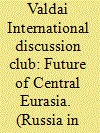

|
|
|
|
|
| Summary/Abstract |
The year 2014 saw Russia turn towards the East, establish a genuine strategic partnership with China, and embark on a radical transformation of its relations with the West. These historic changes coincided with the beginning of a new stage in Eurasian integration and the advancement of several strategic initiatives by Beijing. The most important of them is the Silk Road Economic Belt concept, a large-scale investment and transport/logistics project, announced in 2013.
|
|
|
|
|
|
|
|
|
|
|
|
|
|
|
|
| 5 |
ID:
140159


|
|
|
|
|
| Summary/Abstract |
Political events in 2014 brought to the fore a more fundamental disagreement between Russia and the West about the European security architecture and the distribution of power in Russia's neighborhood in general. Yet political implications are far broader, and likely to be felt for years, moving Russia closer to emerging powers such as China and India, but also to Brazil.
|
|
|
|
|
|
|
|
|
|
|
|
|
|
|
|
| 6 |
ID:
140153


|
|
|
|
|
| Summary/Abstract |
Comparing the national interests of China and Russia is especially important today when the two countries are going through a period of rapid political rapprochement, where it is vital to have a clear understanding of the partner's logic. This article will try to analyze the foreign-policy strategies of the two countries and the attitudes of their elites to the contemporary international system through the prism of their national interests.
|
|
|
|
|
|
|
|
|
|
|
|
|
|
|
|
| 7 |
ID:
140148
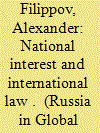

|
|
|
| 8 |
ID:
140149


|
|
|
|
|
| Summary/Abstract |
Several factors that determine the current position of Russia cause it to protect its specific interests (national or subnational) at the global level. These factors include Russia's geography (the largest country in the world and common borders with the two largest economic and military powers - the United States and China); its nuclear weapons potential, which is comparable to that of the U.S.; the permanent member status in the UN Security Council; and the size of its economy, which ranks among the worlds top ten economies in terms of purchasing power parity.
|
|
|
|
|
|
|
|
|
|
|
|
|
|
|
|
| 9 |
ID:
140141
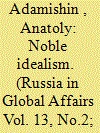

|
|
|
|
|
| Summary/Abstract |
The spring of 2015 marked the 30th anniversary of Soviet leader Mikhail Gorbachevs policy of perestroika. A unique period in Russian history, the paradigm of the Soviet Unions development underwent a cardinal change in a peaceful fashion. In fact, the system of priorities was revised and new policy guidelines were identified. A powerful wave of enthusiasm and a sincere desire for change swept over society. Yet the disappointment was prompt and bitter. The reforms of the late 1980s ended in a profound socioeconomic crisis and the disintegration of the Soviet Union. We are still experiencing the aftershocks of those tectonic tremors and are asking the same, still unanswered, questions, while clashing in disputes that should have been finished years ago. Perestroika and its foreign policy remain underestimated in Russia. Until we take an impartial look at this crucial stage in Russia's development, I fear we will remain trapped in the vicious circle of historical doom.
|
|
|
|
|
|
|
|
|
|
|
|
|
|
|
|
| 10 |
ID:
140151
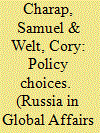

|
|
|
| 11 |
ID:
140146


|
|
|
|
|
| Summary/Abstract |
After the breakup of the Soviet Union an overwhelming majority of countries seemingly came to a consensus that the democratic path was inevitable, so many scholars and experts began to discuss the new era of peace and good neighborliness. The tacit consensus envisioned the unavoidable gradual integration of developing countries into the Western system, and some people began to entertain dreams about the end of history and triumph of Western liberal democracy.
|
|
|
|
|
|
|
|
|
|
|
|
|
|
|
|
| 12 |
ID:
140158


|
|
|
|
|
| Summary/Abstract |
The association of Russia, Brazil, India, China, and South Africa (BRICS) has completed the full cycle of presidencies, and this year it is Russia's turn to host the summit. Why do we need this organization? Have we got from it what we wanted? In Russia, analysts are largely unanimous on the tasks faced by the five-member alliance. Executive Director of Russia's National Committee for BRICS Studies Georgy Toloraya, in his article "Why Does Russia Need BRICS?," indicated that the first objective of the association was to reform international financial institutions; the second one, to create mechanisms for maintaining security; and the third one, to facilitate inter-civilizational interaction.
|
|
|
|
|
|
|
|
|
|
|
|
|
|
|
|
| 13 |
ID:
140160
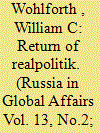

|
|
|
|
|
| Summary/Abstract |
Anarrative has taken hold around the world that might be titled "the return of Realpolitik." From the happy days of globalization in the 1990s to the frenzied war on terror and associated counterinsurgency struggles of the first decade of the 2000s, the argument goes, great powers and geopolitics are back. Walter Russell Mead put this conventional wisdom well: "Whether it is Russian forces seizing Crimea, China making aggressive claims in its coastal waters, Japan responding with an increasingly assertive strategy of its own, or Iran trying to use its alliances with Syria and Hezbollah to dominate the Middle East, old-fashioned power plays are back in international relations."
|
|
|
|
|
|
|
|
|
|
|
|
|
|
|
|
| 14 |
ID:
140157


|
|
|
|
|
| Summary/Abstract |
Several fundamental factors are propelling Ukraine into disintegration. In the medium term, however, a more likely scenario is the existence of several autonomous regions, nominally united in a single state but actually independent of the central government.
|
|
|
|
|
|
|
|
|
|
|
|
|
|
|
|
| 15 |
ID:
140155


|
|
|
|
|
| Summary/Abstract |
There is a widely-spread opinion among experts, both Russian and foreign, that Russia has forever discredited itself in the eyes of Ukrainians by acting the way it did during their "revolution of dignity" and the subsequent secession of Crimea and the war in Donbass, and is now generally viewed as an aggressor. Some claim there is no use for Russia to look for a compromise solution and it should instead adhere to an aggressive policy.
|
|
|
|
|
|
|
|
|
|
|
|
|
|
|
|
| 16 |
ID:
140147
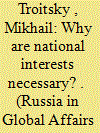

|
|
|
|
|
| Summary/Abstract |
International relations are concerned with national interests and how they evolve. Some researchers insist that there are obligatory and unchangeable interests expressed in terms of power or prosperity. Others suggest reconstructing national interests depending on how a country acts in a particular situation. Still others hold that national interests are relatively stable, but can vary considerably due to external factors, such as emerging or disappearing norms, institutions, or circumstances.
|
|
|
|
|
|
|
|
|
|
|
|
|
|
|
|
| 17 |
ID:
140152


|
|
|
|
|
| Summary/Abstract |
In underscoring the difficulty of predicting the Kremlins next steps, many Westerners would often cite Winston Churchill's famous reference to Russia as a "riddle wrapped in a mystery inside an enigma." Few, however, recall the remainder of that 1939 adage: "But perhaps there is a key. That key is Russian national interests."
|
|
|
|
|
|
|
|
|
|
|
|
|
|
|
|